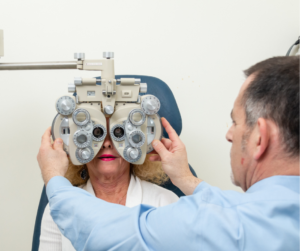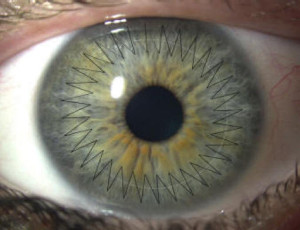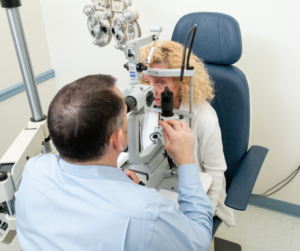24 Hour On-Call Emergency Eye Care
Emergency care includes treatment for red eye, scratched corneas and removal of metal foreign bodies, as well as ocular trauma, corneal and scleral lacerations, ruptured globe repair, laser treatment of retinal tears and holes, emergent medical or surgical treatment for acute glaucoma attacks, evaluation and management of sports or recreational injuries, and automobile accidents involving the eyes and the orbits.
Dr. Vale is also the eye care provider of choice for over 38 summer camps in the Poconos and Endless Mountains of Pennsylvania. Parents of Pocono summer campers can put their minds at ease, knowing that their kids will be provided with the most prompt and compassionate care for eye emergencies while away from home, with Dr. Steven Vale of InterMountain Eye Associates.
Comprehensive Eye Exams
A thorough examination of the anatomy of the eyes includes both a comprehensive slit lamp bio-microscope examination and a dilated eye exam. InterMountain’s Dr. Vale will screen for glaucoma, diabetes and cataracts, as well as for dry eye, infection, allergies, injuries, macular degeneration and inflammatory conditions. Vision is tested and prescriptions for eyeglasses or contact lenses are provided as needed. Medications and recommendations for follow-up care may be given as well.
Diabetic Eye Care
Regular eye exams and ongoing care and management of diabetic patients are highly recommended to prevent blindness from occurring. Dr. Vale will maintain communication with the patient’s Primary to manage the patient’s diabetes through ongoing eye exams. We work closely with diabetics and their primary care providers to detect their disease and manage conditions associated with diabetic eye disease, such as Glaucoma, Cataracts, and Retinopathy, in their earliest stages. We can provide examinations and perform medical and laser surgical treatments or, if necessary, refer patients to a retinal surgeon for additional care.Dry Eye Evaluation and Treatment
Causes of dry eye and chronic ocular irritation vary and treatment is targeted at addressing causes and individual needs. At InterMountain, we don’t just hand you a bottle of artificial tears and tell you to live with this condition. Our multiple modality approach to dry eye is holistic and has the goal of curing or ameliorating the problem to the greatest extent possible. Dry eye therapy at InterMountain follows a thorough evaluation of the eyes and surrounding structures and may include recommendations for over–the–counter eye-drops, prescription eyedrops, punctal occlusion, Ω-3 fatty acids, oral medications or eyelid hygiene therapy.Cataract Evaluation and Post Cataract Surgery Care and Treatment
Dr. Vale will screen for cataracts by performing a visual acuity test, a slit lamp examinationand a dilated eye examination. InterMountain Eye will arrange cataract surgery if needed. Post-operative cataract care, including management of discomfort or swelling, complications from surgery, vision testing and prescriptions for eyeglasses following recovery are provided by our doctors and staff.
Contact Lens Examination and Prescribing
Fitting and follow-up examinations and contact lens trial prescriptions are available. We encourage patients with problems with contact lens wear to contact us immediately and to avoid wearing contacts until being evaluated by our doctor.Examinations for Worker’s Compensation Eye Related Work Injuries
InterMountain Eye provides urgent and emergent eyecare for workplace injuries, documentation of injuries and ongoing treatment. We contract with a number of worker’s compensation claims managers and are the providers of choice for many of these plans.Eye Infections
Treatment for fungal, viral and bacterial keratitis and conjunctivitis, whether contact lens related or not, as well as for other types of infections is offered by our doctor. Dr. Vale, being an experienced cornea specialist, is especially well versed in the proper diagnosis and treatment of all manner of corneal and external ocular infections.Retinal Evaluations
Examinations are conducted to evaluate floaters, macular degeneration, peripheral retinal degenerations and retinal holes. We have the capacity to treat a large number of retinal diseases that are amenable to repair with ophthalmic lasers. Other retinal problems may require surgical intervention and can be promptly identified and referred to a local retina specialist.Corneal Transplants
The cornea is the clear front window of the eye that covers the colored iris and the pupil. Light passes through the cornea so we can see. To have clear vision, the cornea must be healthy. If the cornea is damaged, swollen, scarred, or irregularly shaped, the cornea may scatter or distort light, resulting in glare or blurry vision.Conditions that may require corneal transplants:
- Corneal failure after prior eye surgery, such as cataract surgery or retinal procedure
- Keratoconus, a steep curving of the cornea often caused by chronic eye rubbing
- Hereditary corneal failure, such as Fuchs’ Dystrophy or stroll dystrophies
- Scarring after infections, especially after herpes or bacterial keratitis
- Scarring of the central cornea after traumatic injury
Corneal Transplant Surgery

Here the corneal graft has been sutured by Dr. Vale onto the host’s rim after removal of the diseased cornea.
